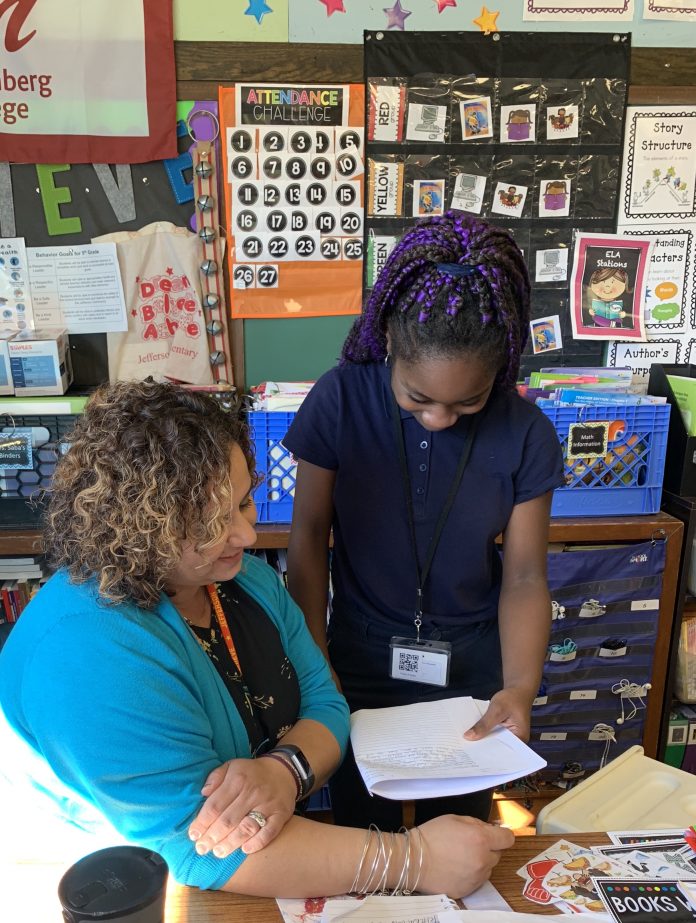It’s 2 o’clock on a Friday afternoon, and I am in front of 24 fifth graders who stare wide-eyed at me as I get ready to interview their teacher. I fumble with my notebook, looking at the list of questions I’ve prepared.
“So, Mrs. Saba,” I ask, “What made you want to be a teacher?” Saba smiles and looks at her students. “I think I have always wanted to be a teacher. I loved learning. As a kid, I would setup my bedroom as a classroom and act out being a teacher.” She pauses as her students laugh. “However, as I grew up, I grew interested in business, particularly marketing and communications. After working in the business world and being away from the Lehigh Valley, I decided to do what I have always wanted to do in the back of my mind — teaching.”
Juliet Saba, a fifth-grade teacher at Jefferson Elementary and a Muhlenberg alumna, has spent her entire teaching career in Allentown, but she has called the city home for much longer. Saba grew up in the 6th Ward, a predominantly Syrian neighborhood in Allentown. With six siblings, Saba is the youngest in her family and the only member born in the United States. “My parents were poor, didn’t speak English and had no education themselves,” she recalls. “They came to America for a better life. They arrived in Allentown only two years before I was born.” While Saba loved school, much of it was difficult for her. “My parents couldn’t speak English, so they couldn’t come to my school conferences, meet with my teachers or help me with my homework. I had to learn to be independent and rely on myself to be a successful student.”
Saba’s story is not unlike many of the students in Allentown School District’s classrooms. According to the Pennsylvania Department of Education, 85.14 percent of students in the Allentown School District are economically disadvantaged, and 89.15 percent are members of a minority group. The stigma associated with Allentown is one Saba works hard to diminish in her classroom.
Saba tells us, “I always make it known to students that I went to school in Allentown, that I grew up in a home with another language, that my family didn’t have much money, but I worked hard to achieve my goals.”
The connection Saba has with her students is grounded on the fact that they both call Allentown home. Saba is not an outsider — she lives and breathes this city as much as her students do. While Saba leaves Jefferson Elementary at 3:30 p.m., her mind is always moving. “I want more people in the Lehigh Valley to see all the tremendous things that are happening in our classrooms and the dedication and determination of our teachers and students.” Saba sighs and looks around her room, where her students are playing together while I finish the interview. She points at a student reading a book at his desk. “He reads at a 12th-grade level. He is going to get into any college he wants.” She nods her head toward a girl playing with her friends on the carpet. “She can solve any math problem you give her.” Saba looks at me with tears in her eyes. Grabbing a tissue, she says, “Allentown students and our district don’t often get recognized for our academic rigor and achievement, but if people actually invested their time into our schools, they would see the incredible work that is done within our district.”
Saba is taking her passion for education to the next level at Lehigh University, where she is currently completing her Masters in Educational Leadership and K-12 Principal Certification, and will graduate in the spring of this school year. As I watch Saba interact with her students, it is evident that she provides far more than the basics of an elementary school curriculum. Saba gives a rare representation for students — to see a first-generation student, a child of immigrants, a narrative so much like their own — in their teacher. There is incredible power in having the person who teaches you every day know your struggles and your fears, your streets and your stories, because they used to be sitting in your seat. Saba smiles and looks at her students. “Class, what do I always tell you that you can be?” she asks. They smile back and reply, “Anything.”






















